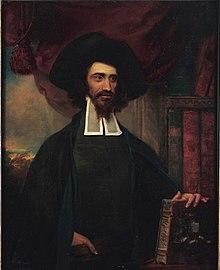Rabbi Solomon Hirschell (12 February 1762, London – 31 October 1842, London) was the Chief Rabbi of Great Britain, 1802–42. He is best remembered for his unsuccessful attempt to stop the spread of Reform Judaism in Britain by excommunicating its leaders.
His name is also spelt Hirschel and Herschell.
His father was a Polish Jew from Galicia, Hirschel Levin, Chief Rabbi of London and Berlin and a friend of Moses Mendelssohn. His older brother was the Talmudist Saul Berlin.
He died on 31 October 1842 (27th of Cheshvan 5603), and was buried in the Brady Street Cemetery near Whitechapel in London's East End.[1]
References
- "Solomon Hirschel – High Priest of the Jews"
- History of the Great Synagogue, Cecil Roth, Chapter XIII:Rabbi Solomon Hirschell and his contemporaries (Susser archive)
- Rubinstein, Hilary L. (2004). "Hirschell , Solomon (1762–1842)". Oxford Dictionary of National Biography (online ed.). Oxford University Press. doi:10.1093/ref:odnb/13363. Retrieved 2011-12-09. (Subscription or UK public library membership required.)
- The British Chief Rabbinate
- Specific
- ^ "Brady Street Cemetery". United Synagogues. Retrieved 29 June 2017.
| Jewish titles | ||
|---|---|---|
| Preceded by David Tevele Schiff | Chief Rabbi of Great Britain 1802–1842 | Succeeded by Nathan Marcus Adler |
